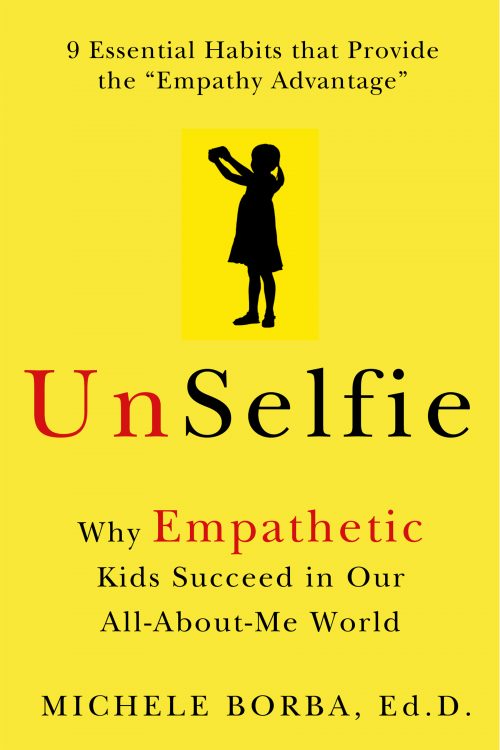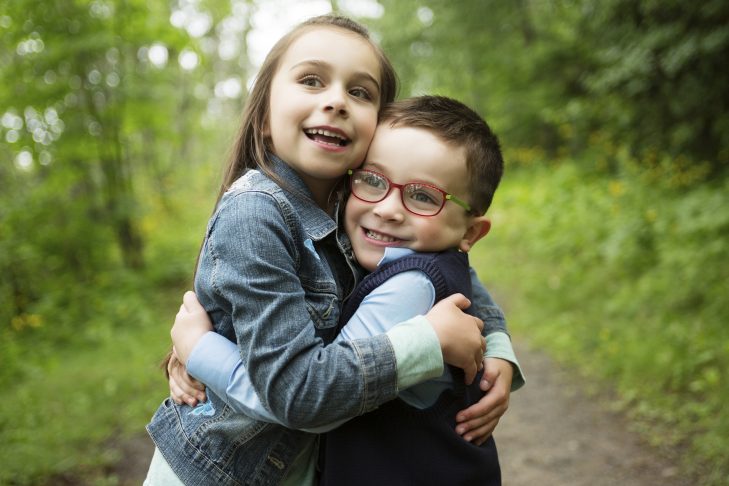NBC contributor Dr. Michele Borba‘s new book, “UnSelfie: Why Empathetic Kids Succeed in Our All-About-Me World,” is full of advice on how to raise sensitive, moral, compassionate children in an era of instant gratification and social media. She also lectures frequently about bullying prevention and school shootings.
According to Borba, kids today are 40 percent less empathetic than they were 30 years ago. Today’s parents and kids are up against fresh challenges brought on largely by devices, she says.
“We’ve become a lookey-look society. The more you plug in, the more it diminishes your ability to read other people. The first habit in ‘UnSelfie’ is emotional literacy: You can’t help someone unless you know they look upset. Make sure you have digital free time where you reclaim the lost art of conversation,” she says. Tuning out virtual reality and tuning into other people’s emotions is a great lesson for kids and adults of all ages, she adds.

The good news: Empathy is teachable. Borba has cited Holocaust survivor Samuel P. Oliner’s concept of altruism: In order to make someone an altruist, you have to model it, expect it and provide opportunities to do good. That’s where parents come in.
Borba recently spoke about the book at Harvard University, and she stopped to talk with JewishBoston about how to bring up caring children whom she calls “change-makers.”
Here are her top five tips:
Change your lines of questioning
Stop asking, “What did you do at school today?” Or inquire, but instead of probing about test scores or who won the soccer game, ask what sort of empathetic actions your child might have taken for someone else. “Flip the script,” Borba suggests. “Ask, ‘What kind of caring things did you do today?'”
Make empathy a habit
Stressing the importance of caring isn’t a one-time lecture. It’s a way of life. “In order to have the courage to be a change-maker, you have to really exercise your empathy muscles,” Borba says. It’s a daily workout. To help kids think about others all the time, integrate it. Put a box by the door for used clothes or toy donations. Encourage them to set aside part of their allowance to give to charity. And model this behavior as an adult too. Explain how you might take part of a paycheck and donate it to a charity or ask them to help you set aside canned goods for a food pantry. Modeling this behavior all the time, not just around the holidays or special events, makes it concrete for kids.
Provide positive reinforcement every day
Borba says that parents often place emphasis on grit: winning a trophy, making a great play on the baseball field, acing a test. But also take time out to praise and honor compassion. If you notice your child helping someone else at the playground, or if you see them being kind to a grandparent, say something! “We praise everything else. Praise compassion too,” she says.
Show examples of empathy in the media
Point out causes that make headlines. Make a big deal out of kids who do great things, like the viral story of Christian Bucks, the first-grader who started a Buddy Bench movement to help lonely kids at recess. “Give examples of real kids who make a difference. Talk about it before bed and see what sparks conversation. This will help you figure out what types of causes your own kids are interested in,” she says.
Stress independence
Let your child enjoy a degree of autonomy when it comes to charity work. Allow them to deliver canned goods to a soup kitchen, or create their own lemonade stand for charity, or deposit toys at a drop-off spot. Monitor them as age-appropriate, but “don’t rob them of that giving moment,” Borba says. “Let them experience the giving high directly.”
This post has been contributed by a third party. The opinions, facts and any media content are presented solely by the author, and JewishBoston assumes no responsibility for them. Want to add your voice to the conversation? Publish your own post here. MORE



